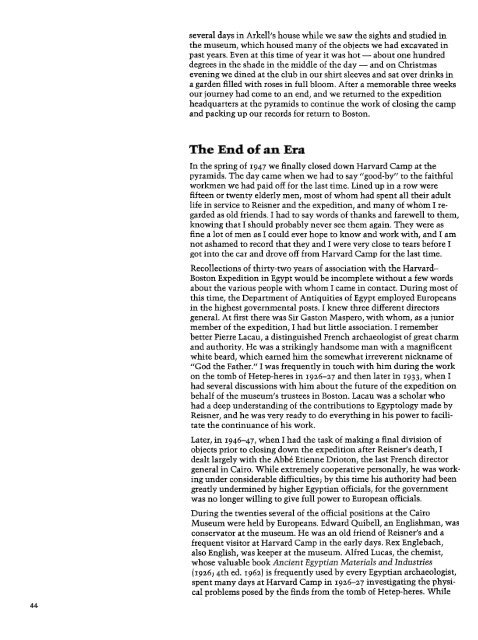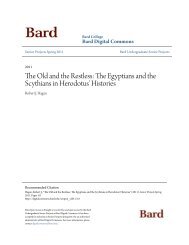Dows Dunham Recollections of an Egyptologist
You also want an ePaper? Increase the reach of your titles
YUMPU automatically turns print PDFs into web optimized ePapers that Google loves.
several days in Arkell’s house while we saw the sights <strong>an</strong>d studied in<br />
the museum, which housed m<strong>an</strong>y <strong>of</strong> the objects we had excavated in<br />
past years. Even at this time <strong>of</strong> year it was hot - about one hundred<br />
degrees in the shade in the middle <strong>of</strong> the day - <strong>an</strong>d on Christmas<br />
evening we dined at the club in our shirt sleeves <strong>an</strong>d sat over drinks in<br />
a garden filled with roses in full bloom. After a memorable three weeks<br />
our journey had come to <strong>an</strong> end, <strong>an</strong>d we returned to the expedition<br />
headquarters at the pyramids to continue the work <strong>of</strong> closing the camp<br />
<strong>an</strong>d packing up our records for return to Boston.<br />
44<br />
The End <strong>of</strong> <strong>an</strong> Era<br />
In the spring <strong>of</strong> 1947 we finally closed down Harvard Camp at the<br />
pyramids. The day came when we had to say “good-by” to the faithful<br />
workmen we had paid <strong>of</strong>f for the last time. Lined up in a row were<br />
fifteen or twenty elderly men, most <strong>of</strong> whom had spent all their adult<br />
life in service to Reisner <strong>an</strong>d the expedition, <strong>an</strong>d m<strong>an</strong>y <strong>of</strong> whom I regarded<br />
as old friends. I had to say words <strong>of</strong> th<strong>an</strong>ks <strong>an</strong>d farewell to them,<br />
knowing that I should probably never see them again. They were as<br />
fine a lot <strong>of</strong> men as I could ever hope to know <strong>an</strong>d work with, <strong>an</strong>d I am<br />
not ashamed to record that they <strong>an</strong>d I were very close to tears before I<br />
got into the car <strong>an</strong>d drove <strong>of</strong>f from Harvard Camp for the last time.<br />
<strong>Recollections</strong> <strong>of</strong> thirty-two years <strong>of</strong> association with the Harvard-<br />
Boston Expedition in Egypt would be incomplete without a few words<br />
about the various people with whom I came in contact. During most <strong>of</strong><br />
this time, the Department <strong>of</strong> Antiquities <strong>of</strong> Egypt employed Europe<strong>an</strong>s<br />
in the highest governmental posts. I knew three different directors<br />
general. At first there was Sir Gaston Maspero, with whom, as a junior<br />
member <strong>of</strong> the expedition, I had but little association. I remember<br />
better Pierre Lacau, a distinguished French archaeologist <strong>of</strong> great charm<br />
<strong>an</strong>d authority. He was a strikingly h<strong>an</strong>dsome m<strong>an</strong> with a magnificent<br />
white beard, which earned him the somewhat irreverent nickname <strong>of</strong><br />
“God the Father.” I was frequently in touch with him during the work<br />
on the tomb <strong>of</strong> Hetep-heres in 1926-27 <strong>an</strong>d then later in 1933, when I<br />
had several discussions with him about the future <strong>of</strong> the expedition on<br />
behalf <strong>of</strong> the museum’s trustees in Boston. Lacau was a scholar who<br />
had a deep underst<strong>an</strong>ding <strong>of</strong> the contributions to Egyptology made by<br />
Reisner, <strong>an</strong>d he was very ready to do everything in his power to facilitate<br />
the continu<strong>an</strong>ce <strong>of</strong> his work.<br />
Later, in 1946-47, when I had the task <strong>of</strong> making a final division <strong>of</strong><br />
objects prior to closing down the expedition after Reisner’s death, I<br />
dealt largely with the Abbé Etienne Drioton, the last French director<br />
general in Cairo. While extremely cooperative personally, he was working<br />
under considerable difficulties; by this time his authority had been<br />
greatly undermined by higher Egypti<strong>an</strong> <strong>of</strong>ficials, for the government<br />
was no longer willing to give full power to Europe<strong>an</strong> <strong>of</strong>ficials.<br />
During the twenties several <strong>of</strong> the <strong>of</strong>ficial positions at the Cairo<br />
Museum were held by Europe<strong>an</strong>s. Edward Quibell, <strong>an</strong> Englishm<strong>an</strong>, was<br />
conservator at the museum. He was <strong>an</strong> old friend <strong>of</strong> Reisner’s <strong>an</strong>d a<br />
frequent visitor at Harvard Camp in the early days. Rex Englebach,<br />
also English, was keeper at the museum. Alfred Lucas, the chemist,<br />
whose valuable book Ancient Egypti<strong>an</strong> Materials <strong>an</strong>d Industries<br />
(1926; 4th ed. 1962) is frequently used by every Egypti<strong>an</strong> archaeologist,<br />
spent m<strong>an</strong>y days at Harvard Camp in 1926-27 investigating the physical<br />
problems posed by the finds from the tomb <strong>of</strong> Hetep-heres. While

















